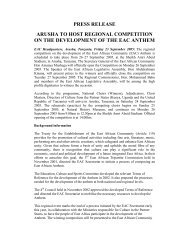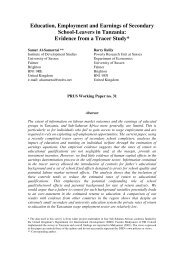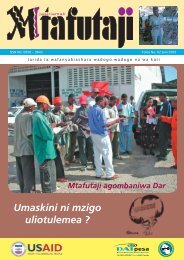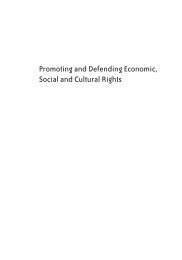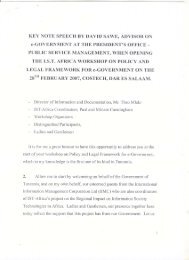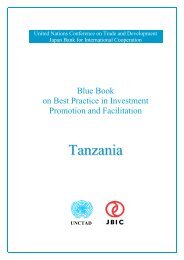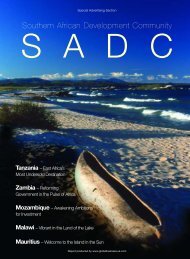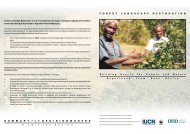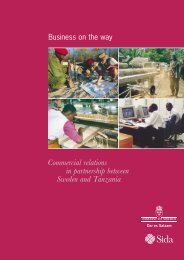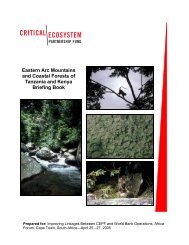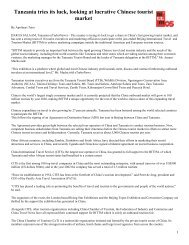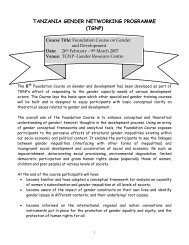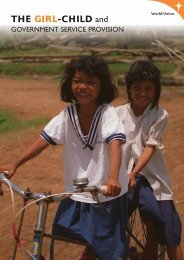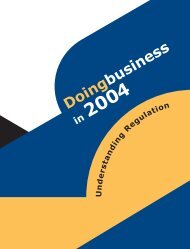September 2005 - Tanzania Development Gateway
September 2005 - Tanzania Development Gateway
September 2005 - Tanzania Development Gateway
Create successful ePaper yourself
Turn your PDF publications into a flip-book with our unique Google optimized e-Paper software.
ASPO Ireland<br />
www.peakoil.ie/newsletters<br />
599. Oil and Food<br />
The critical relationship between oil and food supply is discussed in a comprehensive and perceptive<br />
paper by R.A.Leng, a Professor at a School of Rural Science and Agriculture in Australia, as summarised<br />
below:<br />
Implications of the decline in world oil reserves for future world livestock production<br />
In the near future, a reduced availability of primary resources as well as environmental, ecological,<br />
social and political issues will have major effects on rural development. Escalating costs of fossil fuel will<br />
precipitate a cascade of environmental, economic, political and cultural changes for which society is<br />
unprepared. The energy supply–demand deficit has the potential to eclipse climate change as the driving<br />
force for sustainable development. In the future, fuel and other costs of crop production will be included<br />
in the sale price of products and agricultural land use patterns will move to towards cropping for alcohol,<br />
biomass and bio–fuel production, particularly in the industrialized world. Competition for grain between<br />
food for humans, feed for livestock, feedstock for fermentation industries will intensify and the use of<br />
more expensive cereal grains for livestock production will need to be substantially reduced. Accordingly,<br />
meat protein will be derived less from industrialized pig, poultry and feedlot cattle enterprises and more<br />
from ruminants nourished by forages and by–products of crop production. Developing countries will<br />
require a non–fossil–fuel dependent development strategy, which will mean that their societies will be<br />
organized very differently. Food production will come increasingly from smaller, more localized and<br />
decentralized communities with mixed farms (producing multiple crops, animals, birds and fish) rather<br />
than specialized farms producing only a few products. (rleng@ozemail.com.au)<br />
600. The Investment Community’s Response to Peak Oil<br />
The Financial Times of August 16 th carried a prominent article by George Magnus of the UBS Investment<br />
Bank, which reviews the impact of declining oil production on the world economy, ending with the advice<br />
that we must “keep a wary eye out for the economic side effects when the current spate of economic<br />
momentum weakens as it must”.<br />
The investment community itself cannot be expected to have any real knowledge of the businesses in<br />
which its members invest. In the past, they worked on the basis of trust and close relationship, with the<br />
primary objective of receiving dividends and interest on loans, but those days are long over, as both the<br />
investment community and the managers of the companies themselves work only to deliver satisfactory<br />
share prices as judged by the market. Accordingly, the role of the investment community has reduced to<br />
speculative buying and selling to deliver a return from such market fluctuations. Their skill is less in<br />
identifying promising investments as such and more in tracking what each other are doing which itself<br />
dictates the market and, hence, the changing value of the holdings. They work at two levels: first, protecting<br />
their own fortunes and those of their privileged clients, and second managing massive institutional money<br />
that continuously flows over them. Naturally, they try to make sure that the first level is always ahead of the<br />
second, but to avoid any accusation of insider trading, they publish their recommendations for the “flavour of<br />
the month” before making placements at the second level. The consequential rise of the latter provides<br />
income for the former.<br />
Reading between the lines, we may suppose that the current strength of the market is designed to allow<br />
first level investors to unload at a profit, before the second level sails down with a general crash. That will be<br />
triggered by the admission that declining oil supply removes the possibility of economic growth, which in<br />
turn means both that most present debt has lost its collateral and that most companies quoted on the market<br />
are over-valued by tacitly assuming business-as-usual energy costs.<br />
The primary concern of the investment community is to avoid losing clients, which in turn means that it<br />
does whatever is possible to close ranks and provide each other with the same mindset and viewpoint by<br />
which to react to unfolding events. It is significant in this connection that Goldman Sachs, who shares a<br />
Chairman with BP, forecasts in the Financial Times of 19 th August that oil prices will remain above $60 to<br />
2010 contrasting with the IEA (see Item 598).<br />
In the past, the task of the investment community has been relatively easy in an epoch of overall<br />
expansion and prosperity, albeit subject to superimposed periodic cycles which themselves were useful<br />
mechanisms for profiteering. That was how they climbed one side of the economic mountain over the past<br />
century but now they may now find it more difficult as they slither down the other side, which is more<br />
precipitous. Some wake up to this (see www.sprott.com/pdf/marketsataglance/08-22-<strong>2005</strong>.pdf)<br />
Superimposed on the investment environment is the fiscal environment, which has been progressively<br />
constructed to facilitate the former by introducing many useful and often hidden distortions and benefits.<br />
Capital gains are taxed less than dividends. The facility for companies to treat operating costs, including<br />
ASPO Newsletter 57, <strong>September</strong> <strong>2005</strong> page 8 of 12



